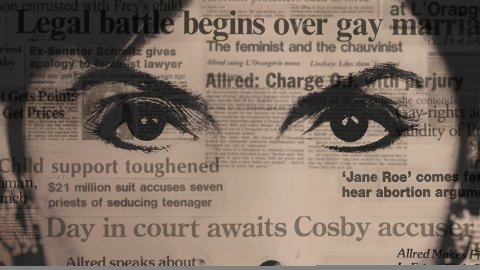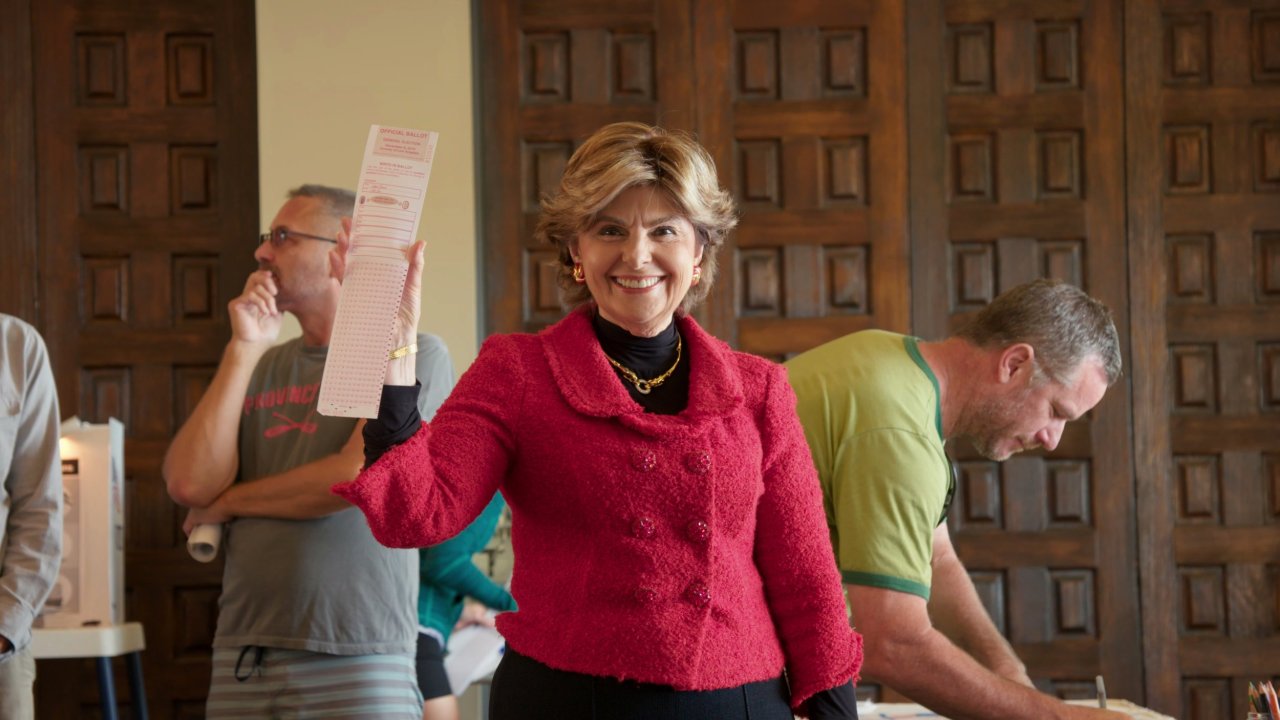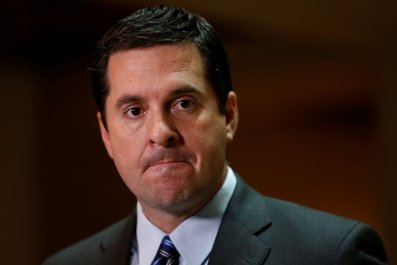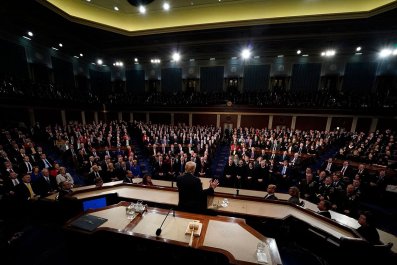Gloria Allred, one of America's most famous attorneys—or infamous, depending who you ask—has been fighting for women for 42 years, and she says she's just getting started. "Women depend on me to be strong, to be fearless and to protect their rights," the 76-year-old attorney says in the new Netflix documentary, Seeing Allred (directed by Sophie Sartain and Roberta Grossman).
The ferocity of her fight and her steadfast commitment to women began after a brutal attack while she was on vacation in Mexico; her date, a doctor, pulled a gun on her. The subsequent rape led to a pregnancy that she chose to abort in pre-Roe v. Wade America—a botched procedure resulting in a hemorrhage. The nurse at the hospital told her, "This'll teach you a lesson."
Allred's personal experiences helped her to understand the hundreds of women she has represented over her long career, including accusers of Bill Cosby and Donald Trump. When a woman has been the victim of injustice and has been hurt, it's always personal, she says.
In the documentary, Allred is asked if she's has any fears. "If I had to name one," she says, "it would be not living long enough to do everything I want to do." The fight, she added, has just begun.
Allred spoke to Newsweek about the Netflix doc, which began streaming on February 9. She is a force of nature who rarely sits still, except when talking about the issues closest to her heart.
At one point in Seeing Allred, you describe the modern world as a war zone for women.
It is, and it has real consequences—emotional, physical, financial, social—every way, every day.
What does the war on women look like in 2018? How has it evolved and how has it stayed the same since you began fighting for women's rights in the 1970s?
There are still so many injustices against women: Inability to collect court-ordered child support in the amount ordered or at the time that it was ordered to be paid, forcing women into lives of poverty and onto welfare, where they don't want to be.
Sexual harassment on the job, interfering with their right to enjoy equal employment opportunity, putting women in a no-win situation. They shouldn't have to trade sexual favors to get a job or to keep a job or get promoted on the job!
Gender violence, rape, sexual abuse, even if it's not employment, leaving in many cases lifelong scars and injuries on the victims.
Child sexual abuse. Pregnancy discrimination. Sex discrimination. Equal pay violations.
I could go on. But I think that's a good short list.
The #MeToo movement has swept the country and the world and, not surprisingly, there's been backlash. What's your response to that?
If we're doing something significant, there's going to be backlash; that's a sign that this is a significant moment in herstory. The #MeToo movement already represents change because women have now decided they're no longer going to suffer in silence. They say they are not going to let fear be the weapon that rules their lives.
Many are speaking out because it is too late for them—because of the statute of limitations, that arbitrary time period set by law—to have access to courts. It's too late for them to file civil lawsuits, it's too late for them perhaps to even have a district attorney prosecute a criminal case even if he or she thought that there was a basis to believe that guilt could be proven beyond reasonable doubt. But since there's no statute of limitations on free speech, they can speak out at whatever point they wish and that's what they're doing.
Are there risks to speaking out?
Yes, and many of these women are unaware of those risks or have decided to take them. So many have said that they want to prevent what happened to them from happening to anybody else. Some are being sued, most are not, but that is a risk in their deciding to more forward that way.
I'm not saying that this is what women should do. It's always wise to seek advice of attorney before making a decision about going on the internet and accusing someone of criminal activity, which is what rape or sexual assault is.
But there is a form of accountability that is going on. Women are feeling empowered in a way that they never felt before, and this for many of them is a form of justice. It's not the conventional form, but it is a form of justice. These women will never agree to be silenced again. Empowerment is contagious and the internet has meant that there are no more gatekeepers and they can say what they wish.
These persons who allege they are victims are on the offensive, whereas in the past they have been on the defensive. It's the accused—who may or may not be wrongdoers—who are now waking up in the morning with nightmares that they may be next.
The point is that there is a reckoning.

Some of your critics have been incredibly harsh, saying they doubt the veracity and integrity of anything you do. That must have taken a personal toll.
No personal toll whatsoever. None. First of all, I get a lot of positive feedback. Secondly, this is the price. Like the suffragists said, Any woman who fears the criticism of men will never make any meaningful difference for women's rights. That's paraphrased but it's very close.
If they're calling me names it must mean that I've won my argument. If they had a good argument against me they would present it. I don't call four-letter words referring to women's genitals creative. That's all you have? They might as well haul out the white flag of surrender.
What is the role of men in this war?
Another line from the women's movement: "A man of quality is not threatened by a woman of equality." In the women's marches we also saw many men—fathers, sons, brothers—demanding equal rights for their mother, sister, wife or daughter. Men have a stake in this as well.
Men did underestimate women, they did underestimate their victims, they did underestimate our refusing to be silent. Now they have to deal with it, and that's good.

What's next in the fight?
We need to add the Equal Rights Amendment to the United States Constitution to guarantee women equal rights under the law. It's been 95 years since Alice Paul first proposed it in 1923!
We need to have more enforcement of laws against sexual harassment in the workplace. If it were Gloria's world, I would provide attorneys paid for by government to represent persons who are victims of sexual harassment, in the same way that defendants who are charged with crimes have court appointed attorneys at no cost if they can't afford one.
Another major issue for me is eliminating the statute of limitations for civil cases of rape and sexual abuse, including child sexual abuse. They need to have access to a court to hold predators accountable civilly as well as criminally, so that victims can win compensation for the harm that's been done to them, to pay for the therapy and medical bills they need.

What's the most important lesson you've learned about making social change?
It's not for the faint of heart. It takes courage. It takes persistence. That's why at the Respect Rally in Park City [on January 20], I led the crowd in the chant, "Resist, insist, persist, elect!" Because that's what we need to do. No you can't do everything, but yes, you can do something. Rosa Parks was not a famous person when she decided she was no longer going to sit in the back of the bus. Find out how you can make a difference and do it.
What's your advice to young women feminists?
It's a battle and everybody needs to be part of it. You can do that by investing your time and money, joining organizations that support change, like the National Organization for Women (NOW) and the National Women's Political Caucus. Young women could start thinking of themselves as potential candidates for elected office. Another thing I liked from some of the leaders of the women's marches this year: "You are the leaders you have been waiting for." I would say that to all the marchers. Think of yourself as a leader. We need you to think of running for public office.












